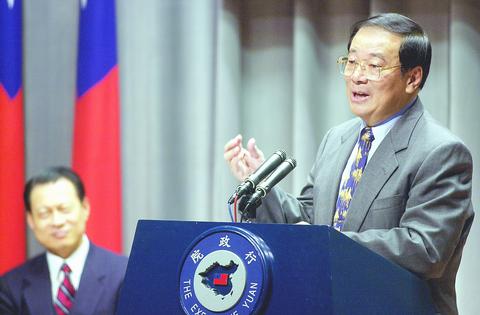Armed with charts and graphs, Premier Chang Chun-hsiung (張俊雄) told reporters yesterday why he thought the DPP government under his leadership was doing a better job than its KMT predecessor.
The premier's speech came in response to criticism from KMT Chairman Lien Chan (

PHOTO: CHEN CHENG-CHANG, TAIPEI TIMES
Chang yesterday said that the DPP government was far more efficient than the previous KMT administration.
"The rate of policy implementation is 98 percent," Chang argued. "And we have achieved many reforms, some of which the KMT government was unable to accomplish."
The premier also sought to draw differences between the DPP and KMT governments. The DPP-led Cabinet has attempted to balance development of northern and southern Taiwan, while the KMT ignored the south, Chang said.
In addition, Chang pointed to a number of international surveys that show Taiwan can hold its own globally.
"Though our country is suffering from an economic depression, many well-known foreign economic surveys still give high marks to Taiwan's competitiveness," he said.
Chang noted that the The World Competitiveness Yearbook, compiled by the International Institute for Management Development, ranks Taiwan eighth in terms of global competitiveness, ahead of Japan, South Korea and China.
Another report from the World Economic Forum ranked Taiwan as seventh worldwide for competitiveness, up from 11th last year.
"Why are there always so many doomsayers in Taiwan?" Chang said, pointing to tables that listed the Cabinet's achievements.
Chang's defense of his job performance comes as many in Taiwan's political circles speculate on who might lead the Cabinet should a coalition government be formed after Saturday's elections.
Last week, President Chen Shui-bian (
In addition, DPP Chairman Frank Hsieh (
Following Chen and Hsieh's remarks, Lien at campaign rallies questioned whether Chang would be replaced and suggested that the president was cheating the public by holding out the promise of a coalition government.
Chen and Hsieh yesterday said they approved highly of Chang and his team.
"I back Premier Chang and his Cabinet 100 percent," Chen said.
"Chang and his team are doing a great job, such as the crackdown on `black gold,' financial reforms, preparatory work for WTO entry and post-921 quake relief, so I still firmly support him."
In addition, Hsieh went on the counter-attack against Lien, saying both party chairmen should step down should their parties fail to win a set number of seats in Saturday's poll.
"Lien has focused on the issue of `political responsibility' by attacking Premier Chang," Hsieh said. "I agree with Mr. Lien's ideal and suggest to him shouldering the `political responsibility' as chairman" if the KMT fails to reach its goal in the elections.
Hsieh said that Lien should take political responsibility for his own actions before demanding others do so.
"If the DPP wins fewer seats in the election than it now holds, I absolutely will resign," Hsieh said.
"And I even dare to announce that if the DPP fails to win more than 80 seats in the legislature or loses a single seat in the county commissioner and mayoral races, I will consider quitting."

AGING: As of last month, people aged 65 or older accounted for 20.06 percent of the total population and the number of couples who got married fell by 18,685 from 2024 Taiwan has surpassed South Korea as the country least willing to have children, with an annual crude birthrate of 4.62 per 1,000 people, Ministry of the Interior data showed yesterday. The nation was previously ranked the second-lowest country in terms of total fertility rate, or the average number of children a woman has in her lifetime. However, South Korea’s fertility rate began to recover from 2023, with total fertility rate rising from 0.72 and estimated to reach 0.82 to 0.85 by last year, and the crude birthrate projected at 6.7 per 1,000 people. Japan’s crude birthrate was projected to fall below six,

US President Donald Trump in an interview with the New York Times published on Thursday said that “it’s up to” Chinese President Xi Jinping (習近平) what China does on Taiwan, but that he would be “very unhappy” with a change in the “status quo.” “He [Xi] considers it to be a part of China, and that’s up to him what he’s going to be doing, but I’ve expressed to him that I would be very unhappy if he did that, and I don’t think he’ll do that. I hope he doesn’t do that,” Trump said. Trump made the comments in the context

SELF-DEFENSE: Tokyo has accelerated its spending goal and its defense minister said the nation needs to discuss whether it should develop nuclear-powered submarines China is ramping up objections to what it sees as Japan’s desire to acquire nuclear weapons, despite Tokyo’s longstanding renunciation of such arms, deepening another fissure in the two neighbors’ increasingly tense ties. In what appears to be a concerted effort, China’s foreign and defense ministries issued statements on Thursday condemning alleged remilitarism efforts by Tokyo. The remarks came as two of the country’s top think tanks jointly issued a 29-page report framing actions by “right-wing forces” in Japan as posing a “serious threat” to world peace. While that report did not define “right-wing forces,” the Chinese Ministry of Foreign Affairs was

PREPAREDNESS: Given the difficulty of importing ammunition during wartime, the Ministry of National Defense said it would prioritize ‘coproduction’ partnerships A newly formed unit of the Marine Corps tasked with land-based security operations has recently replaced its aging, domestically produced rifles with more advanced, US-made M4A1 rifles, a source said yesterday. The unnamed source familiar with the matter said the First Security Battalion of the Marine Corps’ Air Defense and Base Guard Group has replaced its older T65K2 rifles, which have been in service since the late 1980s, with the newly received M4A1s. The source did not say exactly when the upgrade took place or how many M4A1s were issued to the battalion. The confirmation came after Chinese-language media reported